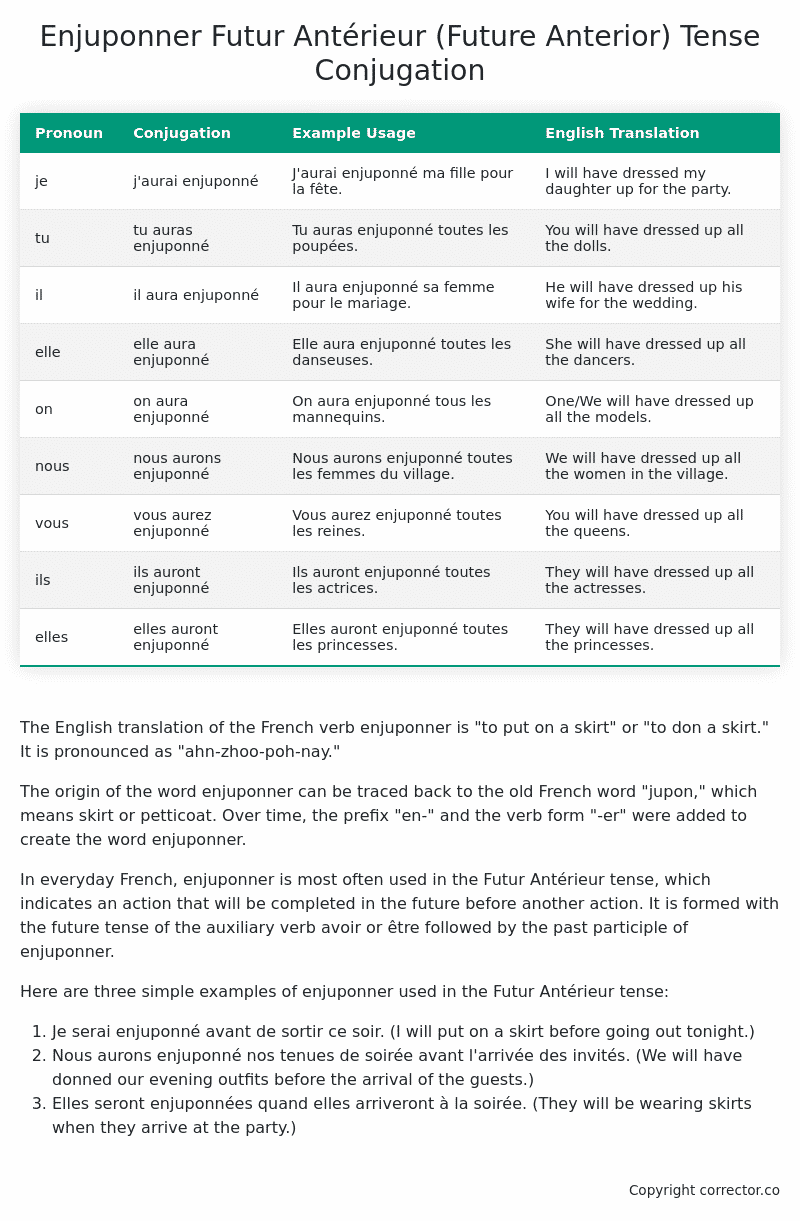Futur Antérieur (Future Anterior) Tense Conjugation of the French Verb enjuponner
Introduction to the verb enjuponner
The English translation of the French verb enjuponner is “to put on a skirt” or “to don a skirt.” It is pronounced as “ahn-zhoo-poh-nay.”
The origin of the word enjuponner can be traced back to the old French word “jupon,” which means skirt or petticoat. Over time, the prefix “en-” and the verb form “-er” were added to create the word enjuponner.
In everyday French, enjuponner is most often used in the Futur Antérieur tense, which indicates an action that will be completed in the future before another action. It is formed with the future tense of the auxiliary verb avoir or être followed by the past participle of enjuponner.
Here are three simple examples of enjuponner used in the Futur Antérieur tense:
- Je serai enjuponné avant de sortir ce soir. (I will put on a skirt before going out tonight.)
- Nous aurons enjuponné nos tenues de soirée avant l’arrivée des invités. (We will have donned our evening outfits before the arrival of the guests.)
- Elles seront enjuponnées quand elles arriveront à la soirée. (They will be wearing skirts when they arrive at the party.)
Table of the Futur Antérieur (Future Anterior) Tense Conjugation of enjuponner
| Pronoun | Conjugation | Example Usage | English Translation |
|---|---|---|---|
| je | j’aurai enjuponné | J’aurai enjuponné ma fille pour la fête. | I will have dressed my daughter up for the party. |
| tu | tu auras enjuponné | Tu auras enjuponné toutes les poupées. | You will have dressed up all the dolls. |
| il | il aura enjuponné | Il aura enjuponné sa femme pour le mariage. | He will have dressed up his wife for the wedding. |
| elle | elle aura enjuponné | Elle aura enjuponné toutes les danseuses. | She will have dressed up all the dancers. |
| on | on aura enjuponné | On aura enjuponné tous les mannequins. | One/We will have dressed up all the models. |
| nous | nous aurons enjuponné | Nous aurons enjuponné toutes les femmes du village. | We will have dressed up all the women in the village. |
| vous | vous aurez enjuponné | Vous aurez enjuponné toutes les reines. | You will have dressed up all the queens. |
| ils | ils auront enjuponné | Ils auront enjuponné toutes les actrices. | They will have dressed up all the actresses. |
| elles | elles auront enjuponné | Elles auront enjuponné toutes les princesses. | They will have dressed up all the princesses. |
Other Conjugations for Enjuponner.
Le Present (Present Tense) Conjugation of the French Verb enjuponner
Imparfait (Imperfect) Tense Conjugation of the French Verb enjuponner
Passé Simple (Simple Past) Tense Conjugation of the French Verb enjuponner
Passé Composé (Present Perfect) Tense Conjugation of the French Verb enjuponner
Futur Simple (Simple Future) Tense Conjugation of the French Verb enjuponner
Futur Proche (Near Future) Tense Conjugation of the French Verb enjuponner
Plus-que-parfait (Pluperfect) Tense Conjugation of the French Verb enjuponner
Passé Antérieur (Past Anterior) Tense Conjugation of the French Verb enjuponner
Futur Antérieur (Future Anterior) Tense Conjugation of the French Verb enjuponner (this article)
Subjonctif Présent (Subjunctive Present) Tense Conjugation of the French Verb enjuponner
Subjonctif Passé (Subjunctive Past) Tense Conjugation of the French Verb enjuponner
Subjonctif Imparfait (Subjunctive Imperfect) Tense Conjugation of the French Verb enjuponner
Subjonctif Plus-que-parfait (Subjunctive Pluperfect) Tense Conjugation of the French Verb enjuponner
Conditionnel Présent (Conditional Present) Tense Conjugation of the French Verb enjuponner
Conditionnel Passé (Conditional Past) Tense Conjugation of the French Verb enjuponner
L’impératif Présent (Imperative Present) Tense Conjugation of the French Verb enjuponner
L’infinitif Présent (Infinitive Present) Tense Conjugation of the French Verb enjuponner
Struggling with French verbs or the language in general? Why not use our free French Grammar Checker – no registration required!
Get a FREE Download Study Sheet of this Conjugation 🔥
Simply right click the image below, click “save image” and get your free reference for the enjuponner Futur Antérieur tense conjugation!

Enjuponner – About the French Futur Antérieur (Future Anterior) Tense
Construction
Common Everyday Usage Patterns
Interactions with Other Tenses
For example
Summary
I hope you enjoyed this article on the verb enjuponner. Still in a learning mood? Check out another TOTALLY random French verb conjugation!


